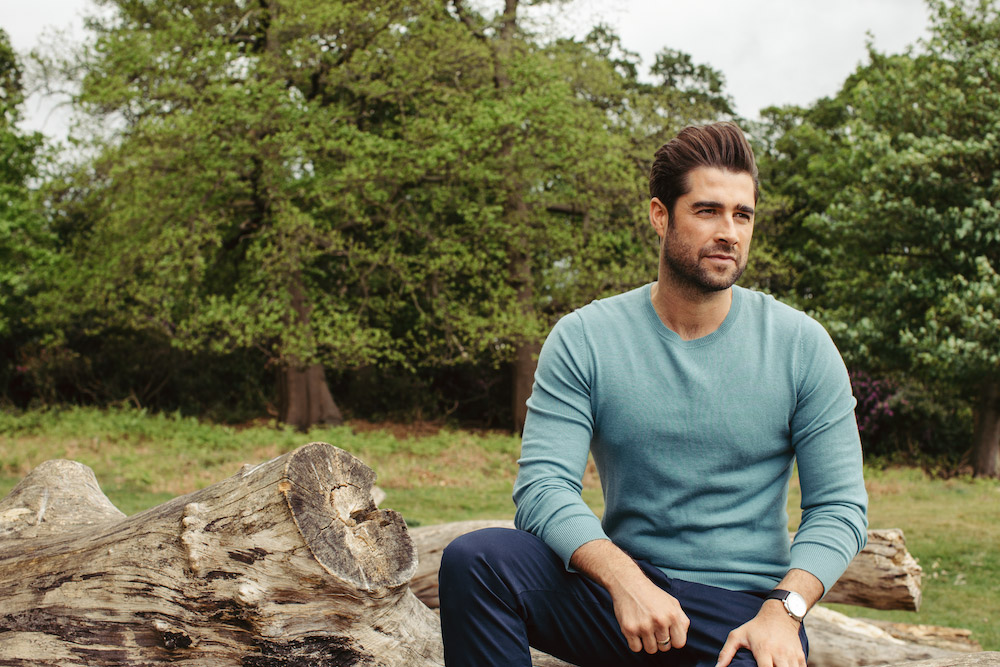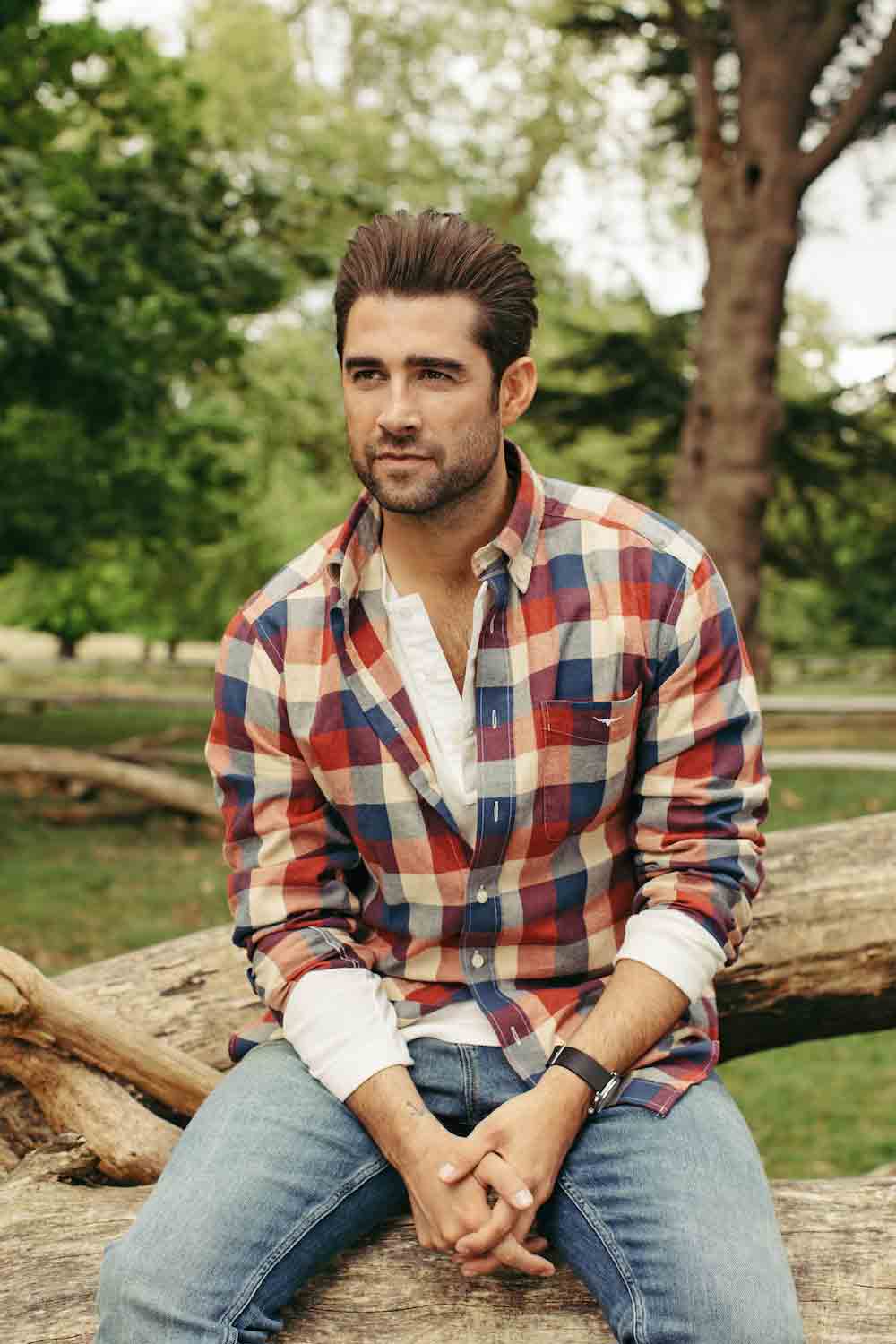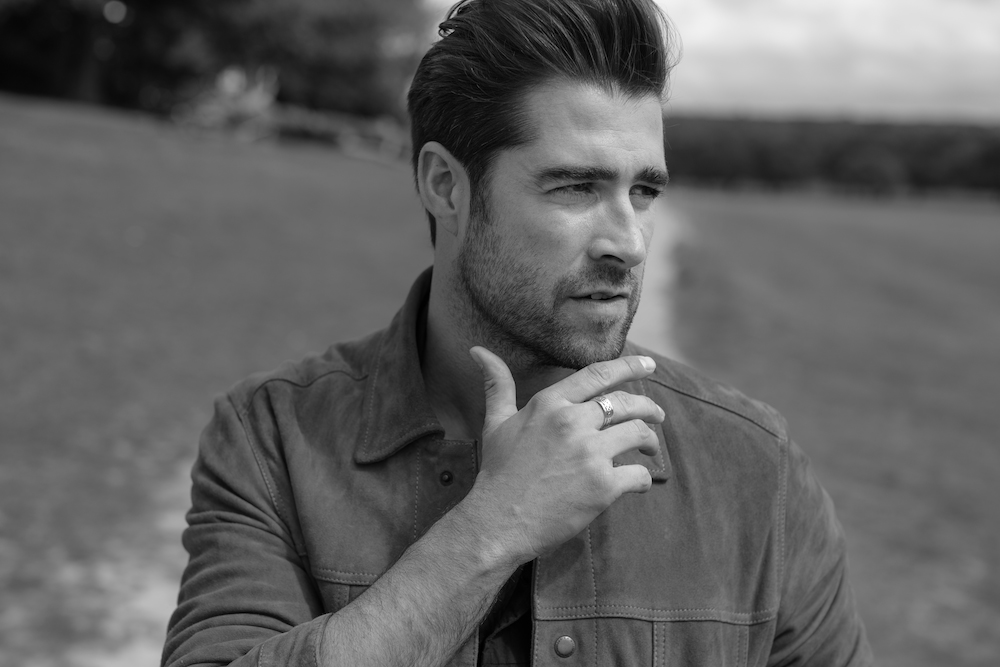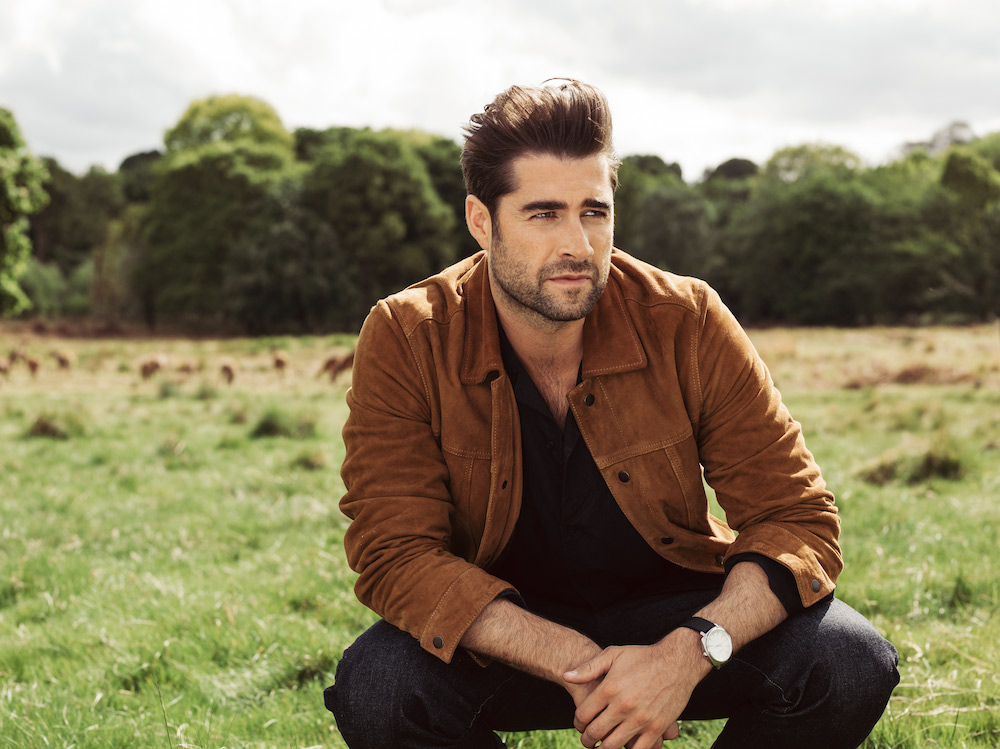TV presenter Matt Johnson made success seem effortless. So why did he almost take his own life? In this fiercely honest interview, he explains his mental health issues, his journey to recovery, and why sharing his story can benefit other young men

happiful magazine / Joseph Sinclair Photography
Somewhere right now in the UK, a group of men will be gathering in a pub for a quick pint and a chat. There’ll be three or four of them, similar in age and outlook, talking shop and trading banter. They’ll discuss the election, the summer transfer window, and that ridiculous muscle car parked outside. Somebody’s boss will get a proper pasting and there’ll be a blue joke that sets the table roaring. It’s all good pub talk. But what they won’t be discussing is that one of them has been having suicidal thoughts, and another is masking his depression.
In a similar pub, on the outskirts of London, I’m sitting with three or four men, one of them TV presenter Matt Johnson, and we’re talking openly about depression. Specifically, his depression. Later, we’ll discuss suicide. Again, his near suicide. If you think our pub talk sounds grim then you’d be within your rights, but wrong. The conversation fizzes with energy and frankness.
“It took me two and half years after contemplating suicide to talk about it,” says Matt. “The more we talk, the less fear there’ll be.”
Matt hid his depression for years, maybe all his adult life. So did his dad, and his grandad before him. Even when he was presenting This Morning with Phil and Holly, even when he came within milliseconds of jumping off a balcony in Spain in 2009, nobody had a clue what he was going through. Then again, neither did Matt. “I couldn’t talk to my friends about it because I didn’t understand it myself,” he admits.
Then he says something surprising, maybe shocking. “I’ve never said this before, but that moment in Spain, 23 December 2009, I wouldn’t change it for the world.”
This needs explaining, so let’s explain it.
We’ll begin with his background. Matt’s your classic Welsh valley boy. He was born and raised in Caerphilly, a mining town in south Wales, in 1982. It was a normal childhood. His dad was a policeman and his mother a housewife. His older brother, Adam, was an exceptional swimmer who competed at national level. The family didn’t have a lot of money, but then nobody really did in the early 80s. They lived on an estate. It was a happy time.
It’s obvious he was blessed with good looks from an early age. (Earlier, he praised the barmaid for her cider and she nearly self-combusted.) But Matt wasn’t an outgoing child. He was a shy boy. “I was very antisocial,” he says. Being a mindful soul, he would get overwhelmed in a room and would toddle off to a quiet corner with his crayons. Matt still loves doodling. It calms him down.

happiful magazine / Joseph Sinclair Photography
His father worked undercover in a drug squad and had issues with bipolar depression, but no one knew at the time. Matt remembers walking on eggshells whenever his father came home. “Only later did I know what he went through with the police force and his own mental health, so no wonder!” Matt says. His passion comes from his dad, but he admits it can be a turbulent passion at times. His mother, who he calls “the calmest, loveliest, warmest person in the entire world”, gave him the chilled-out exterior that can short-circuit barmaids from 10 paces. These two traits, calmness and turbulence, seem like a walking contradiction, but Matt reckons it’s a good mixture.
His contradictory nature became apparent in his teens. “Weirdly I was a loner, because I was pretty much friends with everybody,” he says. Although a sensitive teen, he loved playing the guitar to a crowd, mainly because the girls liked it. “I’m pretty much doing what I do now because girls like it,” he says. But when he moved schools he dropped the guitar and picked up rugby, because the new lads were into it. “The rugby lads distanced me from the creative groups, which is where I really wanted to be. But, hell, I was a teenager.”
There was no mischief in his teens, no going off the rails. Anyway, he couldn’t go off the rails. His father was a copper. Truth is, he was kind of boring. “I really wish I had a story for you of my wild teens, but I was just drifting from one group of friends to another, like a social butterfly, dipping in, dipping out, which made it easier for me to leave. That’s always been my thing.”
At a school performance he got up and sang Robbie Williams’ Angels. He didn’t sing it very well, but he enjoyed the feeling. “It was an incredible buzz. People were saying I should be on stage. It may sound egotistical, but I wanted more of it.”
I was living for five minutes, and then another five minutes, until I had to do something about it. It was the most pivotal moment of my life
The shy kid who loved the limelight was hooked.
At 17 he went to an after-concert party in Cardiff where a TV producer offered him work experience. Soon enough he was getting £65 a day as a runner and extra – a fortune for a teenager. He took to television like a photogenic duck to water. “TV felt normal to me. I didn’t get overwhelmed or nervous by it. I found it exhilarating.”
The boy from Caerphilly rose fast. Soon he was working as a reporter on ITV’s Wales Tonight. Matt calls these apprenticeship years “the absolute best two years of my career” because it’s where he fell in love with television.
“Today, people arrive on TV from reality shows or because they have a huge Twitter following. I was part of that last wave who came through regional television, thank god.”
One day he was watching Phil and Holly on This Morning and decided to send in his showreel. Within the week he was on set. “Suddenly I am on This Morning at 4am and it felt normal. It’s like your nan’s house – the set smells of tea and toast.” He met Eamonn Holmes, who Matt calls his second dad. “Eamonn always walks on set with 10 seconds to go, but on my first day he came to my part of the studio, popped his head around, and said, ‘Matt, don’t f*ck up.’ It was the best thing to say, because it relaxed me.”
It all sounds very wonderful, so when did the storm clouds start to gather?

happiful magazine / Joseph Sinclair Photography
Matt takes a moment. “I must have had depression all my life,” he says. “For me, depression is situational.” He says there was no one specific event, rather lots of little things that weighed him down. This might be wrong. While on Wales Tonight he interviewed his friend Stuart Cable, drummer in the Stereophonics. Two days later, Cable was dead. He choked to death on his own vomit after a drinking session. Matt covered his death. It was emotionally draining for him, and his friend’s death hit a nerve.
There was another big bump. In his early twenties, Matt shattered his cheekbone after falling flat on his face while out drinking. He was in hospital for a week and had a metal plate put in his face. “Suddenly, I was not invincible,” he says. “I felt vulnerable for the first time in my life.” He ponders these words. “Maybe that was the moment? I became scared of making decisions and my confidence took a big dent. The lights definitely dimmed from that moment. Things started to go wrong inside.”
Matt became angrier, grumpier, sadder. He made wrong choices. Money became a problem. He started to rack up debts because he wanted to live the good life and impress his girlfriend at the time, The One Show’s Alex Jones, who was six years his senior. She didn’t know anything. He also started to imagine being asleep in the daytime. “That’s a sure sign of depression,” he says. “I just wanted to curl up and go to sleep. I didn’t want to do anything, certainly not work. I didn’t have much purpose.”
Alex started to have a tough time with Matt because she knew how much fun he could be, but suddenly he didn’t want to have fun any more, or go to social events. Everything became overwhelming. He developed a bit of a stutter. He was confused. He couldn’t understand what was happening inside. “I couldn’t speak sometimes. I couldn’t get out of bed. It felt like those dreams where you’re treading water, but all the time. It was a numb period.”
I couldn't speak sometimes. I couldn't get out of bed. It felt like those dreams where you're treading water. It was a numb period
His relationship slowly went south. TV work plateaued. Then things escalated. Previously, he would only feel his depression when he was alone. Now it encroached on his mind when he was with people.
“That’s when I started to worry,” he says. “It’s like having an out-of-body experience. It’s the most bizarre situation. You look around. You’re aware of people. You’re aware of yourself. Yet someone or something is pushing your head down.”
To cope, Matt turned to drink. Sometimes he drank with friends, but often he drank alone. I ask if he tried talking it over with someone. “Not in the slightest.” Not even Alex? “No. I was hiding from her and everybody else.”
When the relationship ended, Matt found his own apartment and shut himself away. He began drinking a lot of wine and listening to a lot of Jeff Buckley.
“A terrible idea!” he says. “But there’s an element of self-destruction in me. I was trying to get it out of myself.” He continued to self-medicate with booze. He got taxis to work. He didn’t drink in the day because he respected his job, but he spent the weekends drinking on his own and hoping his feelings would sort themselves out. They didn’t, so he drank some more. The hangovers got worse. He drank to smother the pain.
Soon, he was out of control.
“I started having suicidal thoughts,” he says. “They kept creeping in at 4am because by then I was having intense insomnia. I was wondering about it. I was thinking, ‘If you were going to do it, how would you do it?’ That scared me.”
A week before Christmas 2009, Matt flew out to his family’s pad in Spain to straighten himself out. The plan was to eat healthy Mediterranean food, get lots of fresh air, and sober up. When he arrived, it was tipping down. Matt got absolutely bladdered that night at a local KTV bar. The next day he didn’t want food, or sunshine, or fresh air. Instead, he bought a bottle of Jim Beam and got very angry, very self-destructive, and very pissed off because his plan hadn’t worked. The bottle went down easily, far too easily.
“Then,” he says chillingly, “I was in it.”

happiful magazine / Joseph Sinclair Photography
‘It’ was a world Matt had never been to before, a world he wouldn’t wish on anybody. He describes it as a narrowing tunnel. “I couldn’t see laterally. I couldn’t see around myself. It was just an enclosed space of nothingness.”
For the entire week, Matt drank until he passed out. He was polishing off two bottles of Jim Beam in a day. “It was pretty f*cking horrible, my body couldn’t take it.” He’s unsparing in his descriptions, but I won’t repeat the details. Just think of all the gory stuff that comes with being horribly, violently drunk – and then triple it. “I didn’t care anymore,” he says. “I was waking up on the floor. I was waking up everywhere. And it wasn’t a game. It was a case of no way out. I didn’t think about the next day. I was living for five minutes, and then another five minutes, until I got to the point when I thought that was it. I had to do something about it. It was the most pivotal moment of my entire life.”
That moment was evening. Matt was at home, drunk. Nobody was there. He went out on the balcony and looked below. His mind said jump. “I was genuinely going to do it,” he says. “I’d been thinking about it all day and it seemed like the logical thing. I wasn’t thinking of family members. I was thinking on a legitimate level. I was going to do it.”
He had one leg over the balcony when a sudden rush of exuberance took control of him. “Luckily, that rush of adrenaline made me excited again. I chuckled to myself because I was thinking, ‘Would the fall kill me, or just maim me?’ And before the balcony I had gone into the kitchen to cut my wrists but didn’t know how to do that properly either.” All this deliberation took up valuable time. When the euphoria finally hit, Matt stepped back from the edge, and broke down. “Reality rushed into me. I felt the breeze in my hair. I smelt the sick on my clothes. Previously I’d been numb. Now I felt real things. It was very poignant for me. And it was the start of a gradual process.”

happiful magazine / Joseph Sinclair Photography
Matt’s process of recovery, and self-discovery, took nearly three years. Slowly, he found his self-confidence. He focused on work. He exercised. He meditated. He socialised in the daytime hours. But he didn’t officially tell anyone about his depression until he had to. As an ambassador with the mental health charity Mind, he signed up for the London Marathon. Naturally, the press asked, “Why Mind?” Matt had to make a decision. “You have to say the truth. Mind taught me to share, talk and discuss, so I said it.”
The press sniffed a story, namely his break-up with Alex Jones. But Matt took control. He went on This Morning with Ruth and Eamonn and revealed his depression in front of millions. “The amount of people that got in touch was outstanding, not one negative tweet or anything. That changed me. It gave me clarity.” I ask how it changed him. “I had forgotten my worth. I wanted to take responsibility. I wanted to make a documentary about mental health. I wanted to make a slight difference.”
Still, before he could help others he had to help himself. Matt went on a personal journey. It wasn’t always easy. There were down periods, some money issues, and a rough break-up to deal with. But his self-care regime was simple and true – exercise, going outdoors, drinking water, talking to friends, exploring holistic therapies, projecting a goal, meditating, and having some self-respect.
“Self-discovery is a huge thing. You’ve got to work out your shit. Men spend £300 a month on protein to make themselves look good on the outside. Spend £50 on your insides, so your mind is in line with your body. It’s not a fancy thing to be kind to yourself. It’s absolutely a modern necessity.”
Self-discovery is a huge thing. You've got to work out your shit. It's not a fancy thing to be kind to yourself. It's absolutely a modern necessity
Last month Matt presented the BBC-S4C documentary Iselder a fi (Depression and Me), a personal exploration of his own mental health issues, and a wider look at mental health problems among young men. The response has filled him with hope. “It feels amazing to have done it,” he says.
Not everyone was impressed.
Piers Morgan tweeted: “I’m not convinced by this new trend of male public soul-bearing. Time for our gender to get a grip, methinks. Life’s tough – man up.”
Matt gives Morgan’s views short shrift. “Maybe he should go and interview someone’s mum after her son has committed suicide. It makes me think he’s going through his own issues at the moment. To be honest, I feel sorry for him.”
Matt is appalled by the suicide rates among young men in the UK. Suicide is now the biggest killer of men under 45. It eclipses road traffic accidents, cancer and heart disease. What’s worse, men are dying in silence.
Such is the stigma of mental illness.
“There’s a lot of pressure on young men to be men,” says Matt, “and being a man has changed so much for the better, in my opinion. But men have lost their way, and what it means to be a man. I certainly didn’t know what it was to be a man. Today it seems that nothing is enough anymore. But the truth is, it is enough. We just don’t think it’s enough.”
His mission now is to get men talking.
“The more we talk about mental health, the more we discuss it, the more magazines like yours that discuss it, the easier it will be for a man to talk about his feelings.”
What about people like Piers Morgan who keep telling men to snap out of it? Matt says it’s nonsense. “You can’t snap out of a mental illness. Snap out of it? Absolutely impossible. But start to live in the present? Absolutely possible, and completely free.”

happiful magazine / Joseph Sinclair Photography
Matt Johnson: Iselder a fi (Depression and Me) will be available in English later this year. Follow Matt on Twitter at @MattJohnsons
Matt can next be seen in the upcoming British film The Point, a black comedy focusing on mental health and suicide, written and directed by Jasper Warry.
If you have been affected by the themes covered in this article, please contact the Samaritans' help line on 116 123.
Photography | Joseph Sinclair
Styling | Krishan Parmar
Grooming | Alice Theobald at Joy Goodman using Mac, Murad skincare and Wahl tools


Comments